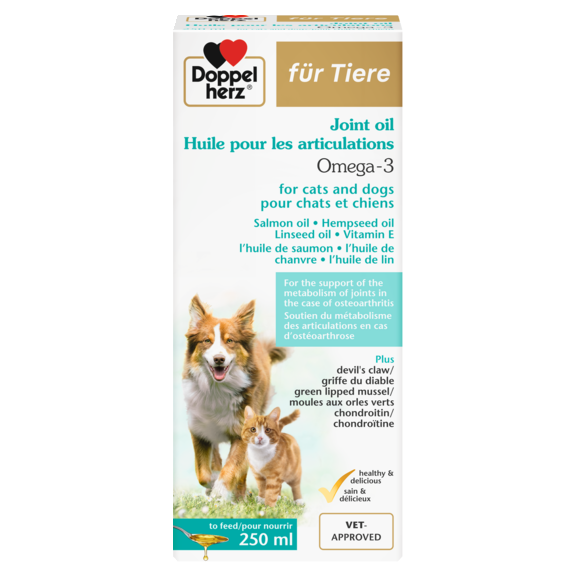Avoid misfitting
Every metabolic process in the body is dependent on the presence of specific substrates, which must be taken in mainly through food. This applies to humans as well as to our pets.
If there is a lack of certain substances due to an insufficient supply, this can have a wide variety of effects. Individual processes can then only be carried out to a limited extent and changes can occur in the tissue - think for example of brittle fur, brittle skin or reduced bone density. Immune defenses may also be reduced, or the animal may appear listless. Most of the time, however, these are imperceptible changes in the body that are not noticeable at first, but do have an impact on health. But not only a reduced nutrient intake can have negative effects, an oversupply can also cause problems. Not all superfluous nutrients are simply excreted. This begins visibly for everyone with an excessive energy intake, which results in obesity. However, an excessive amount of minerals and vitamins can also lead to health risks, as some of them are stored in the body or the increased excretion through the urine leads to urinary calculi, i.e bladder stones.
A diet specially tailored to the individual needs of the animal is therefore essential for good health. This already starts with puppies, which are dependent on a very special diet for their rapid growth. An inadequate supply of nutrients during the growth phase can cause developmental disorders, especially in the musculoskeletal system, which can lead to lifelong joint problems. It is therefore
important to provide optimal nutrition even for the youngest children.
Special needs situations
In special situations, the nutrient requirement can be increased beyond the so-called maintenance requirement. An easily understandable example of this is pregnancy. Additional energy is needed for the growth of the puppies, but the individual micronutrients must also be supplied in increased quantities to build up the new life.
Also, in certain diseases, the body needs support through the increased intake of some substances that are needed for the processes of fighting or healing. For example, in the case of a skin wound, the body tries to form new tissue and heal the wound. On the one hand, the individual components of the skin are needed for this, for example essential fatty acids for building the cell membranes. But also vitamins and trace elements, which are needed for the execution of the synthesis processes as a component of important enzymes, should be supplied in increased amounts in such a situation. The basic building blocks of cartilage tissue such as collagen, glucosamine and chondroitin are also needed to maintain healthy joints or for repair processes after injuries.
But food not only provides the nutrients needed for normal processes in the body, it can also provide ingredients that have effects beyond that. For example, antioxidants such as vitamin E and vitamin C can neutralise free radicals. These are produced during tissue damage and inflammation in the body. In addition, there are various substances that have anti-inflammatory properties and can thus have a direct effect on problems via special feeds. Functional components can therefore be used specifically to support your animal, depending on the health problem.
This sub-field of nutrition is an interesting area of research and a large number of high-quality studies are being carried out to provide a sound scientific basis for the dietetics of our pets. Building on the latest scientific findings, we at Doppelherz design our innovative supplementary feeds and specifically select the ingredients.
Important nutrients and active ingredients to support various areas of health

Essential fatty acids
Essential fatty acids are special unsaturated fats which the body cannot produce itself and which must therefore be supplied with food. They fulfil many important tasks in the body, but are also said to have anti-inflammatory properties, so that an increased intake is particularly useful for certain indications. Salmon oil, for example, provides the special fatty acids EPA and DHA, evening primrose oil and borage oil have a high content of v-linolenic acid, and linseed oil and hemp seed oil are high-quality sources of a-linolenic acid. These special fatty acids can have a positive influence on joint metabolism as well as on skin & coat.
Vitamins
Vitamins are a group of substances that are needed for the metabolism of various bodily functions and must be supplied with food. They are indispensable for building body tissue, cells, energy metabolism and the immune system.
Vitamin E (tocopherol) has antioxidant properties and is therefore beneficial for various tissue damages or inflammations. Vitamin A (retinol) is also called the epithelial protection vitamin and supports skin and coat. The B vitamins are a group of water-soluble vitamins that are hardly stored in the body and regular supplementation is therefore essential. They are involved in numerous metabolic processes that are essential for healthy skin and a shiny coat. Biotin, formerly called vitamin H (because of its important role for skin and hair) should also be supplemented in sufficient quantities for skin health.
Trace elements
Trace elements are minerals that are only present in the organism in small concentrations. However, these proportions do not reflect the relevance of the substances, on the contrary. Trace elements are needed for important processes in the body. Manganese, for example, supports oxidative stress as a component of many enzymes and is needed to build up cartilage substance. Zinc and copper take an important position in supporting the skin in wound healing and in the synthesis of pigments and connective tissue.
Special active components
In addition to the classic nutrients, there are also other effective components whose supplementation via the feed is helpful for special purposes. These include, for example, the components of cartilage substance such as collagen, chondroitin and glucosamine. These are essential building blocks for the formation of new cartilage and stimulate production by the cartilage cells (chondrocytes).
In addition, there are raw materials that can be used which are naturally rich in nutrients as well as active components. These are particularly suitable for supplementing the diet for special nutritional purposes such as for the joints or skin & coat. For example, New Zealand green-lipped mussel contains a combination of important omega-3 fatty acids, chondroitin, vitamins E and C as well as
copper, zinc and selenium. Brewer's yeast, on the other hand, can support skin function with B vitamins, biotin and the trace elements copper, selenium and zinc.
Traditional plant extracts
Before the modern advances in science and research, certain plants had already been used successfully for thousands of years to help with certain problems. In part, the successes derived from experience could also be scientifically attributed to certain ingredients of the plants.
Rosehip contains important carotenoids and vitamin C as antioxidants and an essential substance for collagen formation. The African devil's claw is considered a phytotherapeutic agent for pain in the musculoskeletal system caused by wear and tear due to the bitter substances it contains. The resin of the Indian frankincense (Boswellia serrata) contains essential oils and boswellic acids and is often used to support the joints. Curcumin has been identified as the active ingredient in curcuma root.
So there is also the possibility of drawing on the power of plants and offering special supplementary feeds in combination with other ingredients that can support your pet.

